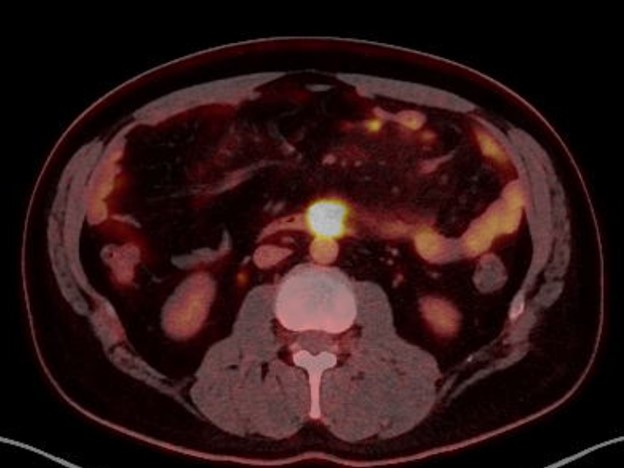Tuesday Poster Session
Category: Interventional Endoscopy
P4563 - Mysterious Mesentery - Evaluation of Sclerosing Mesenteritis With Dominant Lesion
Tuesday, October 29, 2024
10:30 AM - 4:00 PM ET
Location: Exhibit Hall E

Has Audio
- NG
Nathaniel Goss, MD
National Capital Consortium
Bethesda, MD
Presenting Author(s)
Nathaniel Goss, MD, Muhammad A.. Mansoor, MD, Jeffrey T. Laczek, MD
National Capital Consortium, Bethesda, MD
Introduction: Sclerosing mesenteritis is a rare inflammatory process that is usually seen in men
in the fifth and seventh decade of life. A clear cause is not known, but autoimmune disorders,
IgG4 related disorders, abdominal surgeries, abdominal trauma, malignant processes,
and infections should be considered as potential causes. We present a patient without
these risk factors who was found to have sclerosing mesenteritis 7 years after laser
removal of large abdominal wall tattoo.
Case Description/Methods: Our patient is a 44-year-old male who presented to surgery clinic 4 years prior for an
inguinal hernia. Patient underwent CT imaging for operative planning which
demonstrated non-specific mesenteric inflammation in addition presence of an inguinal
hernia. Patient returned 3 years post this imaging for surgical repair of hernia and
underwent repeat abdominal CT scan which demonstrated misty mesentery and
prominent mesenteric lymph nodes likely consistent with sclerosing mesenteritis. He
underwent a laparoscopic inguinal hernia repair and exploratory laparotomy. The ex-lap
demonstrated scarred mesentery in the region of the small bowel.
Patient was followed with PET scan which demonstrated PET avid mesenteric lymph
nodes. Patient had a 6-month surveillance PET scan which was concerning for
progressive lymphadenopathy and a dominant soft tissue lesion with increased PET
avidity compared to prior PET. The lesion abutted the small intestine and was deemed
accessible via trans-duodenal FNB during an upper EUS. The biopsy demonstrated
abundant foamy histiocytes, multinucleated giant cells, scattered chronic inflammation,
regional necrosis, and dystrophic calcifications.
Discussion: This case illustrates the evaluation of a patient with suspected sclerosing mesenteritis
with progressive lymphadenopathy and new soft tissue mass. Upon obtaining further
history patient endorsed getting laser removal of a large tattoo on the anterior
abdominal wall approximately 7 years prior to the index CT scan. Rare case reports of
transient immunoreactivity after laser tattoo removal have been reported, but whether
this plays a role in chronic response present in sclerosing mesenteritis is unclear.

Disclosures:
Nathaniel Goss, MD, Muhammad A.. Mansoor, MD, Jeffrey T. Laczek, MD. P4563 - Mysterious Mesentery - Evaluation of Sclerosing Mesenteritis With Dominant Lesion, ACG 2024 Annual Scientific Meeting Abstracts. Philadelphia, PA: American College of Gastroenterology.
National Capital Consortium, Bethesda, MD
Introduction: Sclerosing mesenteritis is a rare inflammatory process that is usually seen in men
in the fifth and seventh decade of life. A clear cause is not known, but autoimmune disorders,
IgG4 related disorders, abdominal surgeries, abdominal trauma, malignant processes,
and infections should be considered as potential causes. We present a patient without
these risk factors who was found to have sclerosing mesenteritis 7 years after laser
removal of large abdominal wall tattoo.
Case Description/Methods: Our patient is a 44-year-old male who presented to surgery clinic 4 years prior for an
inguinal hernia. Patient underwent CT imaging for operative planning which
demonstrated non-specific mesenteric inflammation in addition presence of an inguinal
hernia. Patient returned 3 years post this imaging for surgical repair of hernia and
underwent repeat abdominal CT scan which demonstrated misty mesentery and
prominent mesenteric lymph nodes likely consistent with sclerosing mesenteritis. He
underwent a laparoscopic inguinal hernia repair and exploratory laparotomy. The ex-lap
demonstrated scarred mesentery in the region of the small bowel.
Patient was followed with PET scan which demonstrated PET avid mesenteric lymph
nodes. Patient had a 6-month surveillance PET scan which was concerning for
progressive lymphadenopathy and a dominant soft tissue lesion with increased PET
avidity compared to prior PET. The lesion abutted the small intestine and was deemed
accessible via trans-duodenal FNB during an upper EUS. The biopsy demonstrated
abundant foamy histiocytes, multinucleated giant cells, scattered chronic inflammation,
regional necrosis, and dystrophic calcifications.
Discussion: This case illustrates the evaluation of a patient with suspected sclerosing mesenteritis
with progressive lymphadenopathy and new soft tissue mass. Upon obtaining further
history patient endorsed getting laser removal of a large tattoo on the anterior
abdominal wall approximately 7 years prior to the index CT scan. Rare case reports of
transient immunoreactivity after laser tattoo removal have been reported, but whether
this plays a role in chronic response present in sclerosing mesenteritis is unclear.

Figure: PET scan demonstrating progressive PET avid para-aortic soft tissue mass.
Disclosures:
Nathaniel Goss indicated no relevant financial relationships.
Muhammad Mansoor indicated no relevant financial relationships.
Jeffrey Laczek indicated no relevant financial relationships.
Nathaniel Goss, MD, Muhammad A.. Mansoor, MD, Jeffrey T. Laczek, MD. P4563 - Mysterious Mesentery - Evaluation of Sclerosing Mesenteritis With Dominant Lesion, ACG 2024 Annual Scientific Meeting Abstracts. Philadelphia, PA: American College of Gastroenterology.
